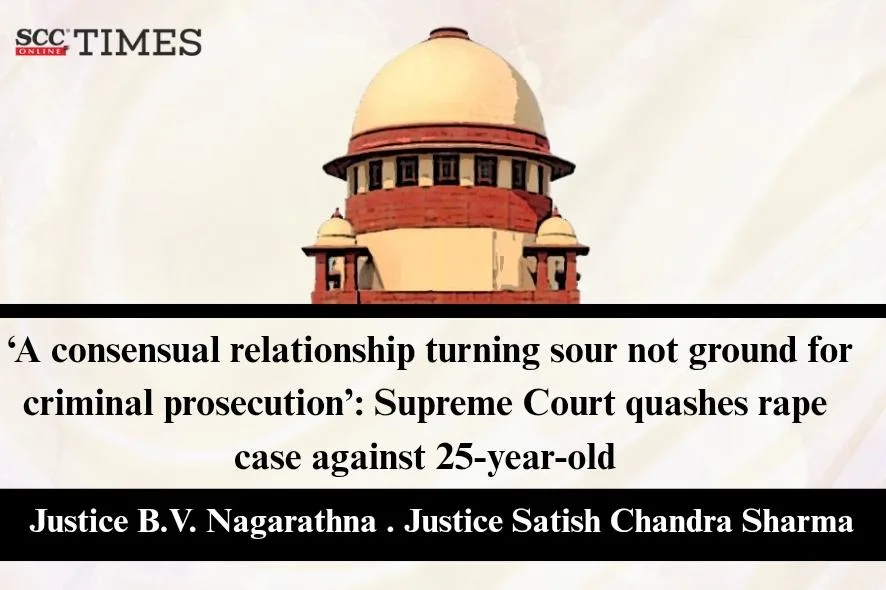Supreme Court: In an appeal filed against the judgment of the Bombay High Court , wherein the petition under Section 482 of the Code of Criminal Procedure, 1973 (‘CrPC’) seeking quashing of criminal proceedings was dismissed, involving allegations under Sections 376, 376(2)(n), 377, 504, and 506 of the Penal Code (‘IPC’), 1860, the Division Bench of B.V. Nagarathna and Satish Chandra Sharma*, JJ. observed that the present case did not involve a false promise to marry from the outset. The Court held that a consensual relationship, which subsequently deteriorates or results in estrangement between the parties, cannot form the basis for invoking the criminal machinery of the State. It further emphasised that such actions unnecessarily burden the courts and irreversibly damage the reputation of individuals accused of serious offences.
Taking into account that the accused was a young individual of 25 years with his entire future ahead of him, the Court was of the considered opinion that subjecting him to a protracted criminal trial would not subserve the ends of justice. To prevent undue hardship and miscarriage of justice, the Court found it appropriate to quash the criminal proceedings at this stage.
Accordingly, the appeal was allowed. The impugned order of the Bombay High Court was set aside. Consequently, the accused was discharged from the case.
Background
A criminal case was registered at the behest of a complaint, alleging that during the period 08-06-2022 till 08-07-2023, the accused forcibly had sexual intercourse with her on false assurance of marriage. The complainant who had been previously married, had obtained Khulanama from her ex-husband and had been residing with her 4-year-old son at her parental home, while the accused, a 23-year-old student of Bachelor of Science (Agriculture) at Krishna College of Agriculture was residing as a tenant next door, with three other men since 25-05-2022.
It was alleged by the complainant that in July 2022, the accused had entered her house at night and said that once she obtains divorce from her husband, he would instantly marry her and on this pretext had sexual intercourse with her, despite her denial. There was a specific allegation that he committed unnatural sex with her. Soon thereafter, the accused reduced his interactions with the complainant and did not answer her phone calls and left for his hometown.
It was further alleged that the complainant had visited the accused’s native village, where she met his parents and other relatives. However, the accused’s family members allegedly refused the proposal of marriage between them on the ground that they belonged to different religions. It was further alleged that when the complainant refused to leave their residence, the accused’s parents, along with his brother and uncle, physically assaulted and abused her, and forcibly pushed her aside.
The complaint in respect of this incident was also registered after a delay of 23 days from the date of the alleged occurrence.
The accused, on the other hand, narrated a different sequence of events. He denied the allegations and asserted that the relationship between him and the complainant was consensual and initiated by the Complainant herself. Consequently, the accused preferred a petition seeking quashing of the criminal proceedings. However, the said petition was dismissed by the High Court. Aggrieved by the dismissal, the accused preferred the present appeal.
Analysis and Decision
The Court, after examining the record and the allegations in the FIR, said that even if the allegations were taken at face value, there was nothing to indicate that the consent of the complainant had been obtained against her will or merely on a false assurance of marriage.
The Court noted that the accused and the complainant had been acquainted since 08-06-2022, and the complainant herself admitted that they interacted frequently and had fallen in love. Although the complainant alleged that the accused had engaged in sexual relations with her without consent, she continued the relationship for over a year and had visited him at lodges on two separate occasions, which did not align with her version of events. The Court found her narrative inconsistent with her conduct.
The Court further observed that the consent of the complainant, as defined under Section 90 of the IPC, could not be said to have been obtained under a misconception of fact. There was no material on record to suggest any inducement or misrepresentation by the accused to obtain such consent, nor was there any evidence to support the claim that he had no intention of fulfilling a promise to marry. It was also brought to light that the Khulanama (divorce) was executed at a time when the parties were already in a relationship and the alleged incidents had already occurred. The Court noted the incongruity of the complainant engaging in a physical relationship on the promise of marriage while she was still legally married to another person. Even otherwise, such a promise was inherently unenforceable and illegal as against the accused.
On the issue of criminal intimidation under Section 506 IPC, the Court held that there was no credible evidence of coercion or threat of injury. The relationship between the parties had appeared cordial throughout, and it was only after the accused graduated and returned to his hometown that the complainant became agitated. The Court also took note of the complainant’s uninvited visit to the accused’s native village, interpreting it as a sign of emotional disturbance and mental unrest, rather than the result of any threat or abuse. The Court observed that the criminal prosecution appeared to have been initiated with an ulterior motive stemming from emotional distress and disappointment.
Furthermore, the Court emphasised the improbability of a previously married woman, with a four-year-old child, continuing a prolonged and voluntary physical relationship with a person who had allegedly exploited or assaulted her.
In conclusion, the Court opined that this was not a case of a false promise to marry from the outset. Rather, it was a case where a consensual relationship had deteriorated over time. The Court cautioned against the misuse of criminal law to settle personal scores, stating that the criminal justice system should not be invoked where a consensual relationship turns sour. Such misuse, the Court noted, not only burdens the judiciary but also unjustly malign the accused, especially in offences as serious as those under Section 376 IPC.
Taking into consideration that the accused is a young individual of 25 years of age, with his entire life and career ahead of him, the Court was of the considered view that subjecting him to an impending criminal trial would not serve as the ends of justice. In the interest of justice and to prevent undue hardship, it was deemed appropriate to quash the proceedings at this stage itself.
Accordingly, the appeal was allowed. The impugned order was set aside. The accused was accordingly discharged from all proceedings.
CASE DETAILS
| Citation: 2025 SCC OnLine SC 1230 Appellants : Respondents : |
Advocates who appeared in this case For Petitioner(s): For Respondent(s): |
CORAM :






